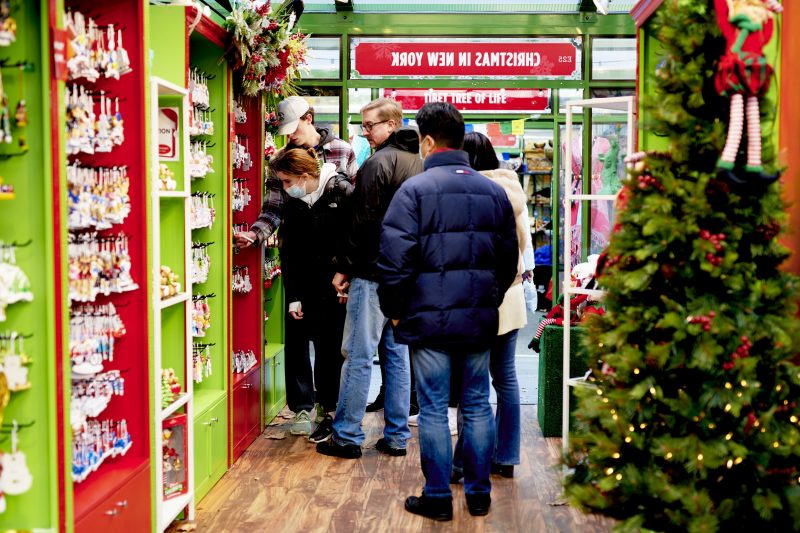
A recession is coming, economists say. When it will hit is a matter of debate.
One reason inflation has held its grip on the U.S. economy is that American consumers continue to spend, seemingly undeterred by the price increases, which has in fact helped to fuel them. But how much longer will all that spending last?
The combined impact of federal relief during the earliest months of the pandemic, the soaring stock market that followed and record-low unemployment left consumers flush with cash, prompting many to splurge on everything from homes to new and used vehicles and vacations. But all of that spending helped to create a supply squeeze that led to the very price increases that now bedevil shoppers.
To counteract the unprecedented demand for goods and services, the Federal Reserve has hiked its key interest rate to a level not seen in years. That has caused the stock market to tank, home price growth to grind to a halt, and interest rates for things like automobiles and credit cards to soar.
As a result, economists are increasingly forecasting a significant economic slowdown.
“With the deteriorating global economy likely to weigh heavily on exports soon and the drag on domestic demand from surging interest rates still feeding through, we suspect it will only be a matter of time before the economy begins to contract,” said Andrew Hunter, senior U.S. economist at Capital Economics research and consultancy group, in a note to clients Wednesday.
But exactly when a recession will hit remains a matter of debate — and could still be a ways off, given a mix of indicators that paint the complex picture of the U.S. economy’s health. That has given some consumers an opening to spend liberally this holiday shopping season. And it could turn out to be the last hurrah for Americans’ spending frenzy before a bona fide economic slowdown unfolds in the coming year.
Few signs of slowing down
There have been few signs of a letup in U.S. purchasing in recent months. Consumer spending increased 0.6% in September, more than the 0.4% expected. Casino operator Caesars Entertainment told investors this week that October was “the strongest month in the history of Las Vegas” for the company.
That is perhaps the clearest sign of consumer enthusiasm in the midst of the current economic environment.
Some companies reporting record revenues in the most recent quarter include Apple, Airbnb, the Ohio entertainment venue Cedar Point, General Motors and Samsung.
Those strong revenues have helped to boost the job market. During a news conference following the announcement of the Federal Reserve’s latest rate hike, Fed Chair Jerome Powell said demand for workers remains strong, a sign that many businesses have kept on hiring.
‘We keep looking for signs that the beginning of a gradual softening is happening and maybe that’s there, but it’s not obvious to me because wages aren’t coming down, they’re just moving sideways at an elevated level,’ Powell said.
‘Last hurrah’
In a recent report titled ‘2022 Holiday Sales: The Last Hurrah,’ Wells Fargo economists forecast another healthy holiday sales season, if slightly more muted than of the past two years.
‘Despite the pandemic, holiday sales have grown at a historic pace for the 2020 and 2021 holiday seasons,’ the economists wrote. ‘This year, with pandemic fears now largely in the rearview mirror, consumers are looking forward to a more typical holiday shopping season.’
But simple math dictates that consumers are eventually going to run out of ways to spend, they write. Notably, the cash reserves that households built up during the previous two years have begun to decline. That’s occurring at the same time that people are putting less money into savings, and that wages, in many cases, are not keeping up with inflation.
‘The sand is running out of the hourglass,’ Wells Fargo senior economist Tim Quinlan said in a follow-up interview with NBC News.
The likely downturn will be moderate, he said, most closely resembling the dot-com bubble burst in 2000 than the great financial crisis of 2008, or the dramatic pandemic drop-off in the spring of 2020.
‘Consumers will say, ‘This is not sustainable. I can’t forever eat the seed corn and use my savings to fund my lifestyle where I’m spending more than I’m making,” Quinlan said.
Holiday plans
But consumers should hold up well this holiday season, experts say. In a survey of nearly 5,000 shoppers, Deloitte found 74% of the respondents said they would spend more or the same on the holidays than they did last year. That’s compared with 75% who said the same in 2021.
‘It’s going to be a good, solid season,’ said Rodney R. Sides, vice chair and U.S. retail leader at Deloitte. ‘We’re not going to set any records, but the consumer continues to pull us through.’
Of course, that doesn’t change the inflation-era facts: Consumers are losing purchasing power, just by virtue of their dollars not going as far as they did last year. But they have proved themselves remarkably resilient, said Kayla Bruun, economic analyst at Morning Consult.
‘But how fast that fuel tank will run out, we’re not really sure,’ Bruun said. ‘Due to the strong labor market, which has been the engine that could, things seem to be holding up.’
